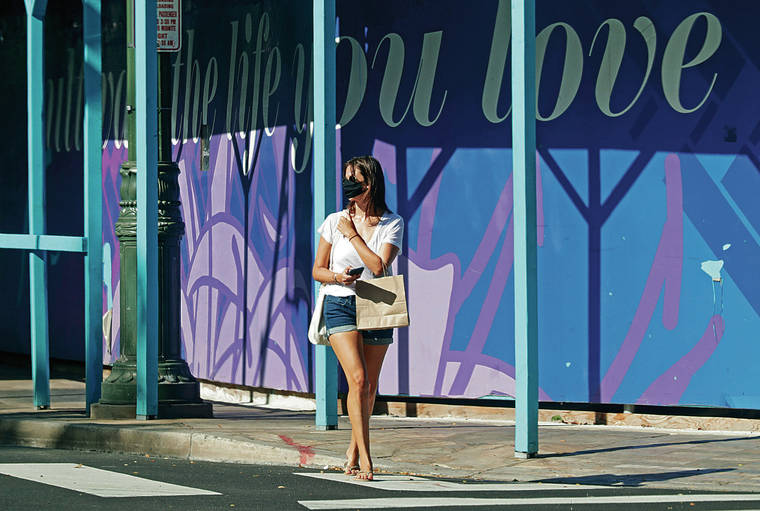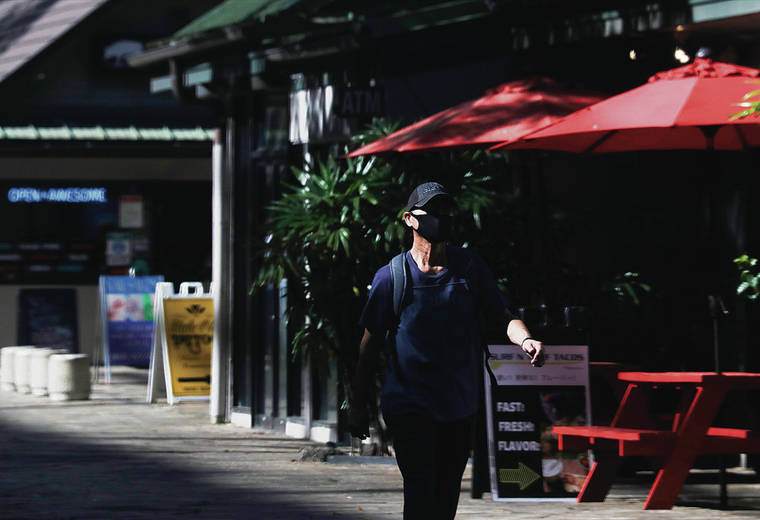Gov. David Ige imposes new decrees for statewide mask mandate, clarifying previously confusing rules


JAMM AQUINO / JAQUINO@STARADVERTISER.COM
A woman wearing a mask walked along Kuhio Avenue on Monday in Waikiki.

JAMM AQUINO / JAQUINO@STARADVERTISER.COM
A man wearing a mask walked along Kuhio Avenue on Monday in Waikiki.



A wide-ranging emergency proclamation Opens in a new tab on COVID-19 makes clear that mask-wearing is “mandatory” on every island, and imposes new statewide rules for hotels and other businesses.
“It will be required for everyone in the state of Hawaii to wear a mask while they’re in public. Period,” Gov. David Ige told the Honolulu Star-Advertiser’s Spotlight Hawaii on Monday.
His 15th emergency proclamation also requires that “an owner or operator of any business or operation shall refuse admission or service to any individual who fails to wear a face covering, unless an exception applies.”
Businesses that don’t comply face fines “and mandatory closure.”
Ige’s statewide mask mandate was first required April 25, but confusion had persisted because of exemptions among Hawaii’s four counties.
Now, “All persons in the state shall wear a face covering over their nose and mouth when in public,” according to Ige’s proclamation.
Don't miss out on what's happening!
Stay in touch with breaking news, as it happens, conveniently in your email inbox. It's FREE!
While exemptions remain, they are now uniform across all islands.
Ige’s latest proclamation also requires hotels to adopt “a COVID-19 Health and Safety Plan for each property.”
Each hotel is now responsible for how to deal with any guests “who become COVID- 19 positive or have been identified as a close contact of someone who is positive for COVID-19. Hotel operators are required to submit their plan to the Hawai‘i Tourism Authority and publish it on their website.”
A series of other COVID- related developments on Monday included Ige’s announcement that the use of Hawaii National Guard troops for COVID-19 duties will have to be curtailed once federal funds expire as scheduled at the end of the year — further slowing Hawaii’s beleaguered economy, the worst in the nation.
And, Oahu-to-neighbor- island quarantines will remain in place “at least for the next couple of weeks,” Ige said.
Ige said Hawaii can be counted on to join any nationwide, anti-COVID-19 efforts under the incoming administration of President- elect Joe Biden.
“We would participate in any kind of nationwide program,” he said. “A consistent policy across the country is important to isolate the virus and stop it from spreading.”
Ige’s plans for islandwide mask rules follow weeks of confusion among both residents and visitors, with the visitor industry asking for a legislative special session to make the rules clear.
House Speaker Scott Saiki and Senate President Ron Kouchi weeks ago asked Ige to issue a supplemental proclamation calling for a statewide mask mandate. Saiki said Monday he appreciated Ige meeting with all four county mayors to clear up any differences.
“The new statewide mask order will provide clarification and avoid confusion,” Saiki said. “I hope that the public will comply with the new order.”
Ige said he spoke with all four county mayors Friday to create identical mask rules across all islands.
Some people, including Saiki, have raised concerns about the misdemeanor penalty for violators, which can result in fines up to $5,000 and the possibility of a criminal record.
Ige said that it would be cumbersome to try to create a uniform mask mandate in a special session — and to reduce the penalties through legislation.
He called the current misdemeanor penalty for not wearing a mask “a real significant penalty. It can go on one’s criminal record and really impact employment for many years to come, unless they’re cleared and their records are expunged.”
With Hawaii averaging 70 to 110 new daily COVID-19 cases across the state, the islands now have America’s lowest rate of new infections, Ige said.
He thanked the public for “doing all of the things we’ve asked of them. … It stopped the exponential increase that we’re seeing across the country.”
Hawaii opened the islands to trans-Pacific travel Oct. 15, as long as arriving passengers test negative for COVID- 19 72 hours before boarding a flight, and has since welcomed 250,000 passengers.
“A lot of them are residents who traveled and came back and brought the virus back with them, Ige said.
But an unspecified number of arriving passengers who initially tested negative “then turned positive in the first few days of them being in the islands,” he said. “Obviously, we are working to identify those cases and really contain them as quickly as we can.”
To further contain the spread of infections, Ige said that Thanksgiving, Christmas and New Year’s celebrations will have to be like no other, greatly reduced in size and restricted to core family or people who have tested negative for COVID-19.
“Auntie makes their famous baked potatoes with cheese,” Ige said. “It’s everything that everybody looks forward to, and we can’t do that this year.”
He encouraged everyone to share family recipes ahead of time and celebrate family gatherings virtually “without actually being in contact face-to-face.”
Otherwise, Ige said, “It’s just something that’s not good for our community.”
Hawaii’s $500 restaurant cards have been wildly successful, Ige said.
The state automatically distributed them to idled island workers who filed unemployment claims, and more than 105,000 were given out and activated in the first three weeks.
As a result, Ige said, “We’ve seen more than $26 million flow to restaurants statewide, and the response has been just really terrific. More than 750,000 transactions occurred in the first three weeks of the program.”
The cards have helped feed needy families while spreading money to farmers, distributors and wholesalers “as well as getting employees back to work,” he said.
There’s now interest in expanding the program before federal support expires at the end of the year.
American Savings Bank, Bank of Hawaii, First Hawaiian Bank, Central Pacific Bank and City Mill are among businesses that want to purchase cards to distribute to employees and customers.
Ige called the interest “overwhelming.”
“We really anticipate that that can help us help ourselves continue to invest in our community to create opportunity and get people back to work,” Ige said.
COVID-19 MASK EXEMPTIONS
>> Those with medical conditions or disabilities who face a health or safety risk by wearing a mask
>> Children under age 5
>> While working at a desk or work station and not actively engaged with other employees, customers or visitors, provided that the individual’s desk or work station is not located in a common or shared area and physical distancing of at least 6 feet is maintained
>> While eating, drinking, smoking, as permitted by applicable law
>> Inside private automobiles, provided the only occupants are members of the same household/living unit/residence
>> While receiving services allowed under a state or county order, rule or proclamation that require access to that individual’s nose or mouth
>> When security concerns, such as in financial institutions, prohibit face coverings
>> While outdoors when physical distance of 6 feet can be maintained at all times
Gov. David Ige issues emergency proclamation that extends statewide mask mandate by Honolulu Star-Advertiser on Scribd




